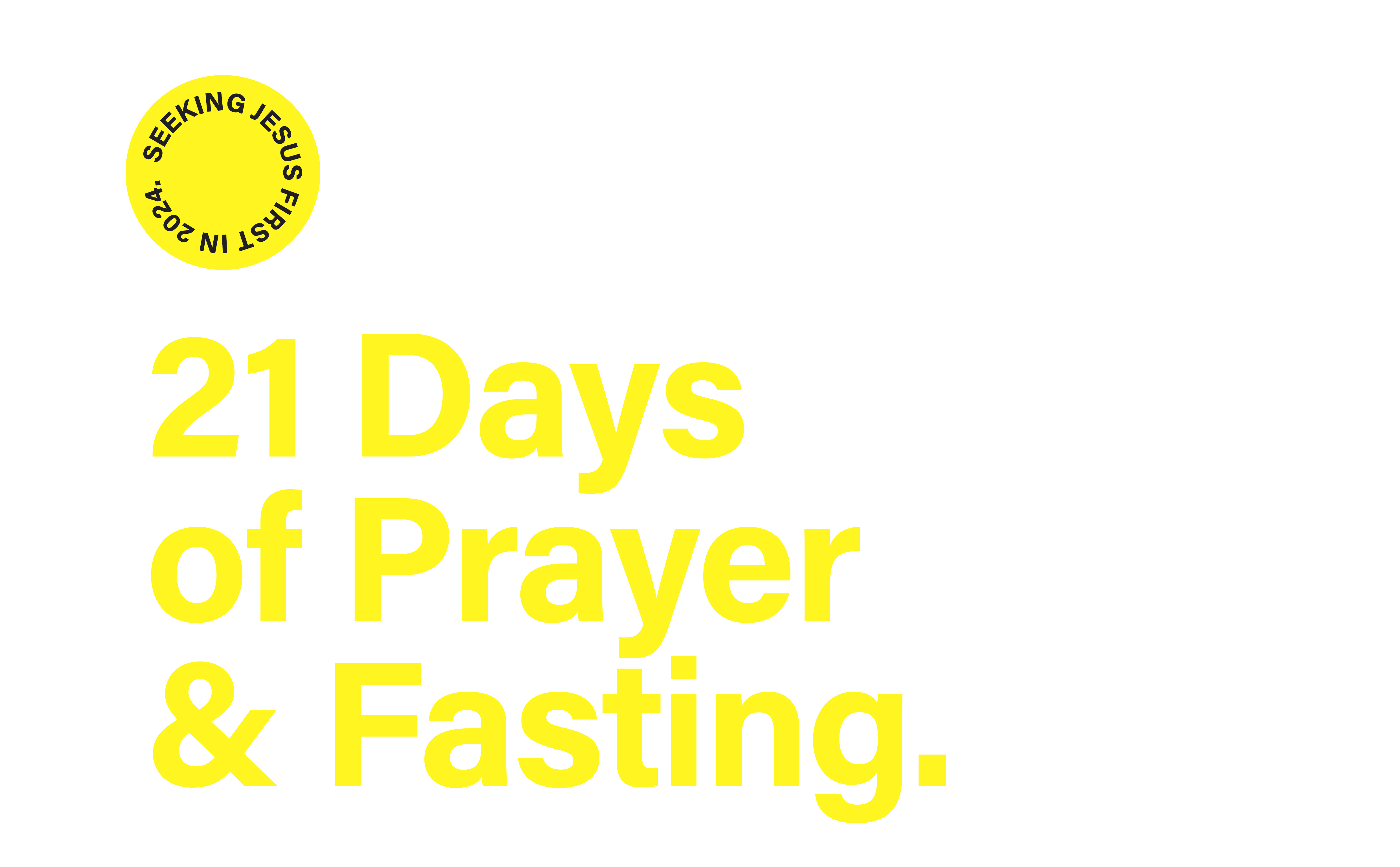
About
As a church we will be praying and fasting from February 3rd – February 23.
Prayer and fasting has been a time honoured practice of Christians from the very beginning of the church, having its roots in Old Testament worship. Fasting is generally a form of abstinence from food, and certain drinks.
The purpose is always to replace the time and pleasure of the fasted activity with prayer and worship.
Fasting in Scripture
Scripture rarely records God requiring people to fast. Besides the fast required on the most holy Day of Atonement (see Leviticus 23:27), Joel 2:12 is the only other explicit reference to God (through the prophet) calling the people to fast. Fasting, however, is commonly offered by God’s people as an expression of repentance and humility, or grief and sorrow.
In the New Testament
– Jesus fasted. Luke 4:12
– Jesus expected his disciples would fast. Mat 6:16-18, Mk 2:19-20
– The early church fasted. Acts 13:1-4
– And 1 Cor 7:5 infers that sexual intimacy can also be fasted by mutual consent in order to pray.
Fasting with prayer is not …
• A way Christians can impress, bribe, manipulate or coerce God
• It doesn’t make people more holy or righteous before God as a result or gain extra favour from God.
• It is has nothing to do with punishing our body as some form of payment for our sins.

So, why fast?
Fasting is an outward expression of our real dependency on God. Legitimate pleasures are replaced by time with God in prayer. It assumes that we enjoy prayer and is a way we can find extra time to pray. Fasting is one expression of earnestness and faith (depending on Christ). Answers to prayer may not come immediately following the fast but many testify to clear answers to prayer later and see a direct link between their fasting and the outcome. This is certainly a biblical position.
A statement is made to ourselves and the Lord, that in the final analysis He is more important than the things of this world. In our fairly comfortable lifestyle, when we go without food or an enjoyable past-time, we experience emptiness, enabling us to transfer that awareness to our need for grace.
Derek Prince says ‘fasting illustrates the beautiful balance between divine grace and human responsibility’. As collaborators with God, there is a part our prayers and obedience play in Gods purposes. Fasting with prayer takes this factor seriously. In Leviticus 23:27, fasting is referred to as ‘afflicting the soul’ in both KJV and ESV translations of the Bible. Fasting causes some real discomfort to our normal sense of wellbeing through the foregoing of some legitimate physical things like food, drink and comfort.
Jesus taught that we should keep our fasting as a matter of private devotion and avoid drawing attention to our self denial. That in itself denies any place for pride and attention seeking.
Going without food and certain drinks for short or long periods of time can bring us into a heightened awareness of how much our so called ‘happiness’ or emotional equilibrium is affected by food. So many of our desires and drives are influenced by what the Bible calls ‘the flesh’. Gal 5:17 describes the flesh as in opposition to the Spirit. When we are yielded to the Spirit in prayer with fasting we are aligned to the Spirit’s work in us and through us. The ‘flesh’ is not the body and there is nothing evil about our bodies. The flesh is our sinful self, the Adamic nature that seeks independence from the Lord our God. That nature wants to make us a slave to its impulses and drives, in opposition to the life of the Spirit.
But our prayer and fasting will be useless if it isn’t matched with a lifestyle of love for others in the most practical of ways. This is the point of Isaiah the prophet’s rebuke in Isaiah 58.
A few years ago, a good friend wanted to take his family to a grand final. It meant he had to stand in line and wait for hours, missing two meals until he could purchase those precious tickets. He didn’t mind the temporary discomfort in order to get the reward but he had to do this secretly without his family knowing or helping.
Written By Ps Brent Williams.
Warnings
Do not go without food and drink for long periods of time (hours and days) if you suffer health problems, have a physically demanding job or have dietary complications. It’s not about some detox or cleansing program although it’s common to feel a bit lethargic or have headaches if fasting several days consecutively until the body adjusts. See your doctor before any lengthy fast and drink lots of water.
Moses and Elijah both fasted food and water for 40 days. These fasts were achieved with supernatural assistance and should not be taken as a model for Christians to follow.
Practical Suggestions
Choose something in your life you will go without.
- A regular meal or drink
- A past-time
- Spend that extra time praying
- It could be the same day each week; a series of days or the same thing for a set number of days.
